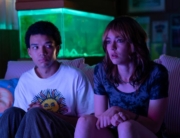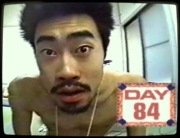

If there is a release this year more inventive and phantasmagoric than We Are Little Zombies, one would be hard pressed to find it.
It focuses on four Japanese 13-year-olds who meet at a funeral home after their parents have been killed, leaving them orphans. They immediately bond and eventually form a rock band, but this isn’t about how music sets one free. The kids dub themselves Little Zombies; they are so zonked out from modern, tech-driven life and the lack of decent parenting that they don’t feel anything at all.
The main narrator and ringleader is Hikari (Keita Ninomiya), a button cute, bowl-haired kid who is never without a Game Boy in his hands. As it’s his narration that drives the story line, the “chapters” are presented as part as a video game. That aesthetic drives the look and feel of the film.
He wears glasses because his addiction to video games has blurred his vision. He doesn’t mind, though. He says he prefers the world blurry. Meanwhile, his parents are always at work, and the fridge is stocked with spaghetti and meatballs in individually wrapped plastic containers.
Then there is Takemura (Mondo Okumura), a lanky lad with an abusive father with significant cash flow problems, and Ishi (Satoshi Mizuno), whose parents died when their restaurant exploded. He has a touching conversation with his father, pre-death, who basically fesses up that going with the flow and not making his own choices left him married with a child, who he, of course, loves but didn’t actually want. Finally, Ikuko’s (Sena Nakajima) parents were killed by her piano teacher in a desperate play for Ikuko’s love.
The four bond over their numbness of their parents’ death, a camaraderie based on an absence of feeling. Lest you think this would make this movie a downer, director-writer Makoto Nagahisa treats everything as a sugar rush. He pulls every trick he can out of the book to make you not stop and think about the sadness of the foursome’s situation. His script is wry, po-faced, and sardonic.
He and cinematographer Hiroaki Takeda, along with editor Maho Inamoto, have put together an aesthetic that is Natural Born Killers on crack: filters on the lenses, animation, whiplash camera moves, quick cutting, and anything you can think off, all the while keeping the narrative off-kilter so you have little idea where anything is going while always, always keeping the humor ever present. The first hour is just delirious and breathtaking. One hopes he can keep it up for the full two-hour running time.
Alas, the movie starts to run out of steam a bit at the hour mark. After the kids decide to form a band, they find a manager who insists they show no public emotion—deadpan in the face of strategy sells. This section, though as energetic as the rest of the film, can’t help but fall into the trap and clichés of various rock band films. Luckily, the songs are fantastic: super catchy, electropop ditties with mordant lyrics. Teenagers would absolutely buy these fictional ditties.
The last third feels a bit like a Wim Wenders road trip reinterpreted for disaffected teenagers. It’s more effective than the previous bit and more affecting as the kids eventually grapple with their emotions (though, to the director’s credit, never sappily).
The acting throughout is superb. There is simply not a weak link. All the kids manage their difficult parts with aplomb, and every supporting part matches them effortlessly. Throughout all the bells and whistles, it’s clear that Nagahisa has a way with his actors.
This is his first feature, and already his creativity has eclipsed the work of many more established directors. Here’s hoping he sticks to his guns and continues his path of presenting idiosyncratic, energetic, and ultimately moving films. An absolute winner.






Leave A Comment